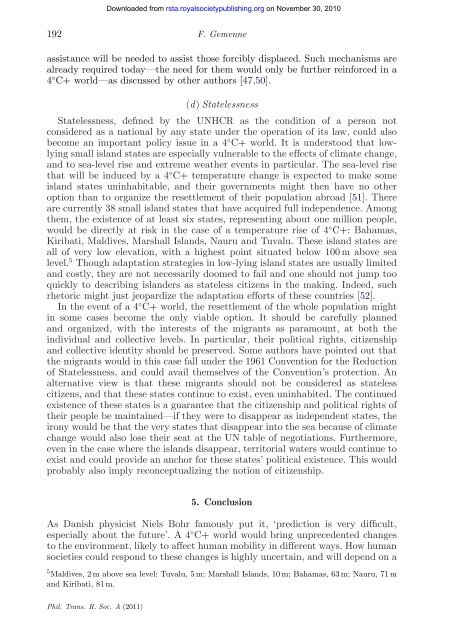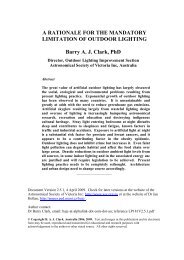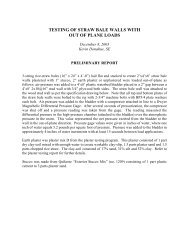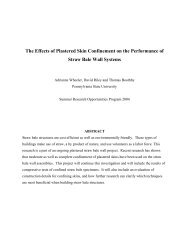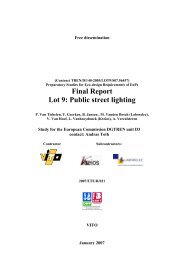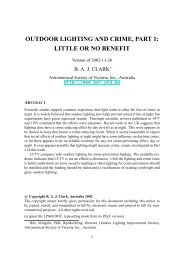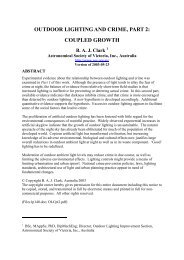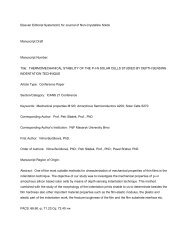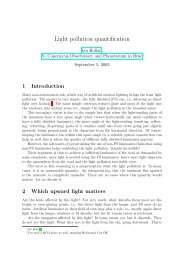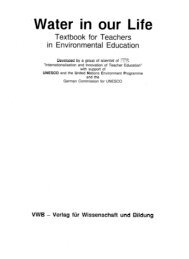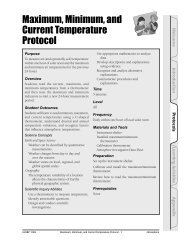Four degrees and beyond: the potential for a global ... - Amper
Four degrees and beyond: the potential for a global ... - Amper
Four degrees and beyond: the potential for a global ... - Amper
You also want an ePaper? Increase the reach of your titles
YUMPU automatically turns print PDFs into web optimized ePapers that Google loves.
192 F. Gemenne<br />
assistance will be needed to assist those <strong>for</strong>cibly displaced. Such mechanisms are<br />
already required today—<strong>the</strong> need <strong>for</strong> <strong>the</strong>m would only be fur<strong>the</strong>r rein<strong>for</strong>ced in a<br />
4 ◦ C+ world—as discussed by o<strong>the</strong>r authors [47,50].<br />
(d) Statelessness<br />
Statelessness, defined by <strong>the</strong> UNHCR as <strong>the</strong> condition of a person not<br />
considered as a national by any state under <strong>the</strong> operation of its law, could also<br />
become an important policy issue in a 4 ◦ C+ world. It is understood that lowlying<br />
small isl<strong>and</strong> states are especially vulnerable to <strong>the</strong> effects of climate change,<br />
<strong>and</strong> to sea-level rise <strong>and</strong> extreme wea<strong>the</strong>r events in particular. The sea-level rise<br />
that will be induced by a 4 ◦ C+ temperature change is expected to make some<br />
isl<strong>and</strong> states uninhabitable, <strong>and</strong> <strong>the</strong>ir governments might <strong>the</strong>n have no o<strong>the</strong>r<br />
option than to organize <strong>the</strong> resettlement of <strong>the</strong>ir population abroad [51]. There<br />
are currently 38 small isl<strong>and</strong> states that have acquired full independence. Among<br />
<strong>the</strong>m, <strong>the</strong> existence of at least six states, representing about one million people,<br />
would be directly at risk in <strong>the</strong> case of a temperature rise of 4 ◦ C+: Bahamas,<br />
Kiribati, Maldives, Marshall Isl<strong>and</strong>s, Nauru <strong>and</strong> Tuvalu. These isl<strong>and</strong> states are<br />
all of very low elevation, with a highest point situated below 100 m above sea<br />
level. 5 Though adaptation strategies in low-lying isl<strong>and</strong> states are usually limited<br />
<strong>and</strong> costly, <strong>the</strong>y are not necessarily doomed to fail <strong>and</strong> one should not jump too<br />
quickly to describing isl<strong>and</strong>ers as stateless citizens in <strong>the</strong> making. Indeed, such<br />
rhetoric might just jeopardize <strong>the</strong> adaptation ef<strong>for</strong>ts of <strong>the</strong>se countries [52].<br />
In <strong>the</strong> event of a 4 ◦ C+ world, <strong>the</strong> resettlement of <strong>the</strong> whole population might<br />
in some cases become <strong>the</strong> only viable option. It should be carefully planned<br />
<strong>and</strong> organized, with <strong>the</strong> interests of <strong>the</strong> migrants as paramount, at both <strong>the</strong><br />
individual <strong>and</strong> collective levels. In particular, <strong>the</strong>ir political rights, citizenship<br />
<strong>and</strong> collective identity should be preserved. Some authors have pointed out that<br />
<strong>the</strong> migrants would in this case fall under <strong>the</strong> 1961 Convention <strong>for</strong> <strong>the</strong> Reduction<br />
of Statelessness, <strong>and</strong> could avail <strong>the</strong>mselves of <strong>the</strong> Convention’s protection. An<br />
alternative view is that <strong>the</strong>se migrants should not be considered as stateless<br />
citizens, <strong>and</strong> that <strong>the</strong>se states continue to exist, even uninhabited. The continued<br />
existence of <strong>the</strong>se states is a guarantee that <strong>the</strong> citizenship <strong>and</strong> political rights of<br />
<strong>the</strong>ir people be maintained—if <strong>the</strong>y were to disappear as independent states, <strong>the</strong><br />
irony would be that <strong>the</strong> very states that disappear into <strong>the</strong> sea because of climate<br />
change would also lose <strong>the</strong>ir seat at <strong>the</strong> UN table of negotiations. Fur<strong>the</strong>rmore,<br />
even in <strong>the</strong> case where <strong>the</strong> isl<strong>and</strong>s disappear, territorial waters would continue to<br />
exist <strong>and</strong> could provide an anchor <strong>for</strong> <strong>the</strong>se states’ political existence. This would<br />
probably also imply reconceptualizing <strong>the</strong> notion of citizenship.<br />
5. Conclusion<br />
As Danish physicist Niels Bohr famously put it, ‘prediction is very difficult,<br />
especially about <strong>the</strong> future’. A 4 ◦ C+ world would bring unprecedented changes<br />
to <strong>the</strong> environment, likely to affect human mobility in different ways. How human<br />
societies could respond to <strong>the</strong>se changes is highly uncertain, <strong>and</strong> will depend on a<br />
5Maldives, 2 m above sea level; Tuvalu, 5 m; Marshall Isl<strong>and</strong>s, 10 m; Bahamas, 63 m; Nauru, 71 m<br />
<strong>and</strong> Kiribati, 81 m.<br />
Phil. Trans. R. Soc. A (2011)<br />
Downloaded from<br />
rsta.royalsocietypublishing.org on November 30, 2010


